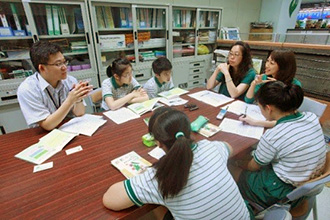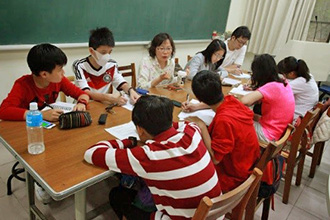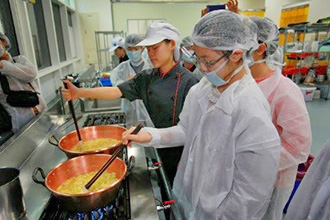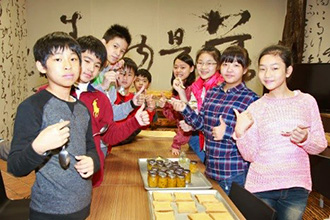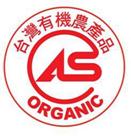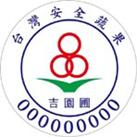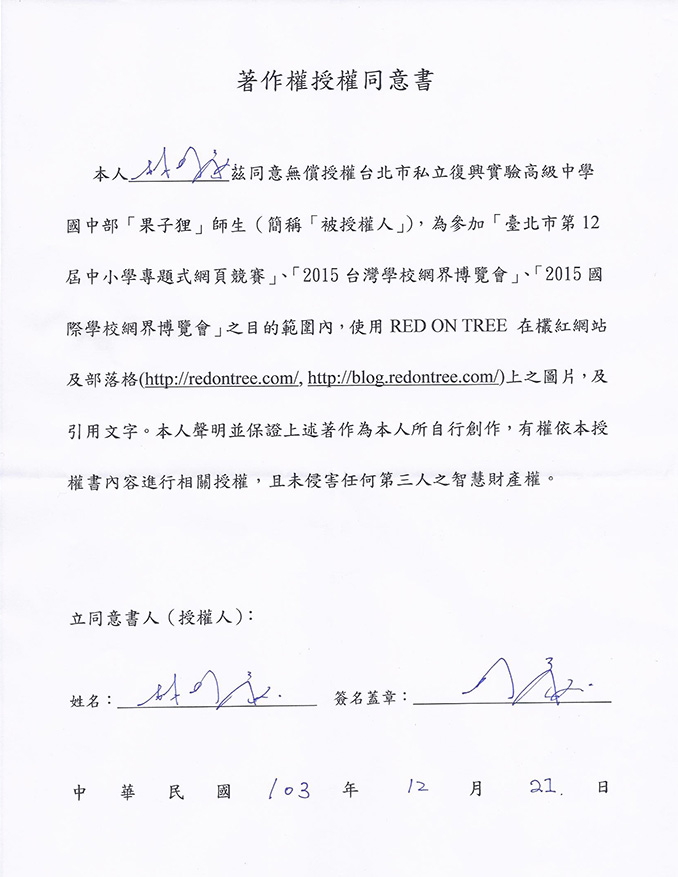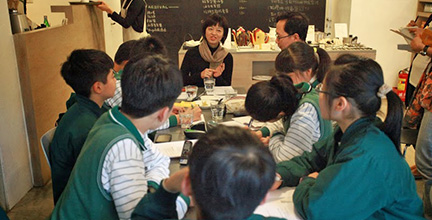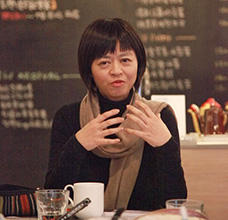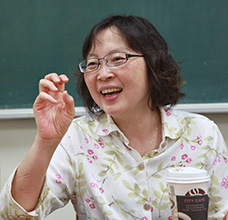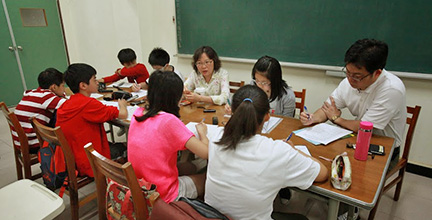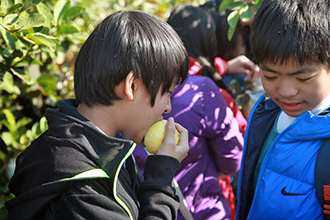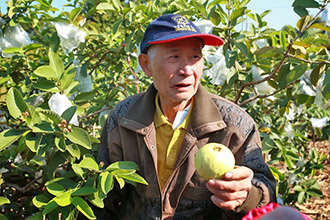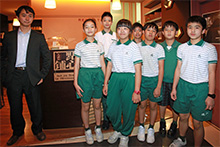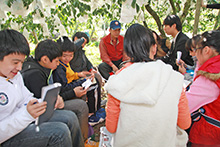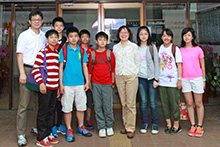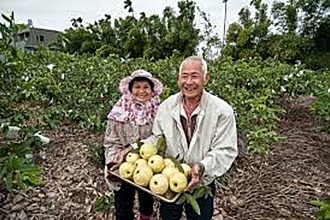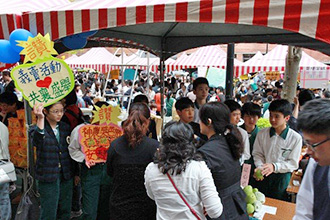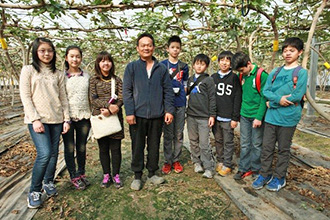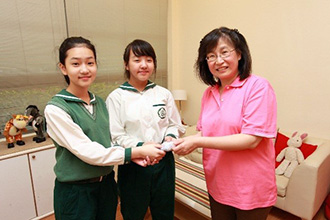 |
 |
 |
 |
 |
|||

|
1. How did your activities and research for this Cyber fair Project support standards, equired coursework and curriculum standards? We have known more about organic or toxin-free farming products in the process of research, and been informed of the harmful consequences of additives. From the interviews, we got acquainted with much more knowledge. In the regard of Nature, we interviewed professors and experts in the areas of food processing and food inspection, thus acquiring knowledge about food safety and genetically modified food, knowing the benefits of organic vegetables and fruit, and improving our own thinking ability and language skills. In the respect of Mathematics, we drew a chart of statistics, which explicitly show us the polled citizens’ opinions and acceptance. In the respect of IT, we employed Excel analysis and made charts. In the area of Integrated Education, we have developed integrational ability in designing questionnaires with our ideas and data at hand. We hope people might get acquainted with the knowledge we have learned in the process. Webpage design is not only about IT capability, it has a lot to do with our curriculum as well.
2. What has been the impact of your project on your community? We visited the factory to learn about making fruit jams, and knew that Red on Tree only uses in-season organic (or toxin-free) fruits and a little sugar for their jams. This has changed my impression of jams and triggered my interest in organic (or toxin-free) food.
The reasons why “Red on Tree” insists on using local organic or toxin-free fruit are as follows: 1) in-season fruits make most natural, yummy jams. 2) Taiwanese farmers may be taken care of in this way. 3) healthful fruit products bring forth immense benefits for the health of our consumers.
This project not only explores organic or toxin-free fruits, but helps us participants to know more about the importance of food safety. Over the last months, numerous crises of food safety have alerted us to the problems of artificial additives and pesticides contained in our daily intake of food and drinks. We hope to awaken people’s awareness in food safety and help them to make better choices in selecting food and drinks every day. 3. Intellectual Property Rights The content of this webpage comes from interviews, discussions, on-site visits, and research done by all the team members. Some photos shall be given credit to “Red on Tree,” which agrees to our using them in this project. Other photos or images have been shot by our teacher or by ourselves. We have won approval from interviewees in citing what they have said. Other resources are in correspondence with the spirit of intellectual property rights.
4. How did your project involve other members of your community as helpers and volunteers? We have made interviews with many famous people, such as a guava planter who won Shennong Award, a columnist Mrs. Yi-lan Yeh, and a professor from Graduate Institute of Food Science and Technology, National Taiwan University. If without their support, we cannot present this wonderful project nor could we learn a lot about food safety and nutrition.
First of all, Mrs. Yi-lan Yeh, founder of Pekoe, has put forth great efforts in running a shop and writing books about Taiwan-made food. On that day of interview, she was generous enough to give us introduction on many sorts of fruits planted in Taiwan. Also, the guava guru led us around to see many kinds of guavas and treat us with the guava species he had grown. One of them is our favorite as it is with fewer seeds and higher sweetness and water. The professor at National Taiwan University displayed her enthusiasm for us and discussed food safety with us ardently. We have learned to view the food-safety problems from a scientific perspective after this visit.
We want to express our deep-felt gratitude for those who helped us along the way. We want to employ the knowledge and experience accumulated from this project in daily purchases and choices of food, and work hard to promote correct ideas about food safety and encourage local agriculture in the future. 5. In what ways did you act as "ambassadors" and spokespersons for your Cyber fair project both on-line and in person. “Red on Tree” is a firm that is like an unseen hero, doing what’s right to help our local farmers. This connects well with the theme of Taiwan School Cynerfair this year: Show Taiwan’s Vitality and Energy! The firm insists on working solely with local farmers as the founder believes this is the best way to prove his love for Taiwan and manifest Taiwan’s agricultural values. I was deeply touched by the farmers’ sincerity and simplicity. They told us what kind of difficulty they have encountered from their insistence on growing organic fruits. I realized then that what a big blessing to live in Taiwan and have good fruits at our dinner table. If without “Red on Tree,” I might not be able to have this valuable experience.
It is hoped that through our webpage, more people might come to understand the value and core spirit of “Red on Tree”. With tiny, small efforts at peeling and emptying out seeds, this company amazes us with creative energy and an unprecedented flavor of fruit. This is our big hope and calling to promote this good firm for the public. 6. Contributions for the Locality We were lucky enough to know about a new firm, Red on Tree, which shows its respect for our land. More importantly, we have made our school, teachers and students alike, know about this firm that combines good farming and advanced food technologies through promotional activities too. Thus everybody at our school has got acquainted with local fruits, food safety, organic/ toxin-free agriculture and so forth. This makes people who are familiar with western eating habits better understand the importance of local farming and identify with local fruit planters.
What impressed us most was the promotional activity of the charity bazaar in the school carnival. Before the carnival, we went to visit a local fruit planter, Chiang Zai-Nung, a winner of Shennong Award. When we walked on the soil which smelled like organic fertilizers and tasted wonderful guavas, we were so moved by the hard-working farmer and decided to introduce this marvelous guavas to school mates. We shall be a bridge to connect with local farmers and consumers. Hence we chose Kid’s Book house in Taitung as our beneficiary, and held a charity bazaar of the guavas and some of the fruit jams by Red on Tree. We donated all the profits for the kids living in remote, mountainous areas. It is great satisfaction for us to become a bridge and convey hope and warmth through this meaningful activity.
In order to pursue a completeness and integral quality of our research, we conducted interviews with fruit planters, as well as famous people from academic, political and business world. In these interviews, we have come to better understand Taiwan-grown fruits and food safety, and make subsequent efforts to demand the government work harder to pay attention on local farming and food safety, so as to provide a better environment of production and marketing, and make Taiwan’s fruit known to the whole world, far and wide. 7. Discoveries, Lessons and Surprises A good firm is established on the foundation of a conscientious leader, while the leader’s notions come from his or her love and concern for the mother land. Therefore, “conscience” is the ultimate protection for any company. From “Red on Tree,” we have realized that many youths in Taiwan are willing to make honest efforts and do right things regardless of failures. We also walked into many orchards and marketplaces where lots of planters and vendors insisted on doing what is good for consumers and selling healthful fruit and vegetables. All such heart-touching matters are delightful and surprising for us, and we feel so blessed to be living on this island. While we worked on this project, a lot of food safety crises broke out within several months, and we cannot help wondering what is happening to Taiwan? Panic among the public, unrest for our well-being and distrust toward big food companies—all these led to people’s unhappiness and anxiety. The greed of merchants had blinded their eyes and done harm to our compatriots. The lessons learned from the incidents are that merchants and the public are all greedy. This was the origin of this calamity. Only with the conscious decisions made by the manufacturers, a complete food inspection procedure set by the government, and an awareness of the public about food traceability, can food safety be established in the future. |
||||||||||||||||||||||||||||||||||||||||||||||||||||||||||||||||||||||||||||||||||||||||||||||||||
|
